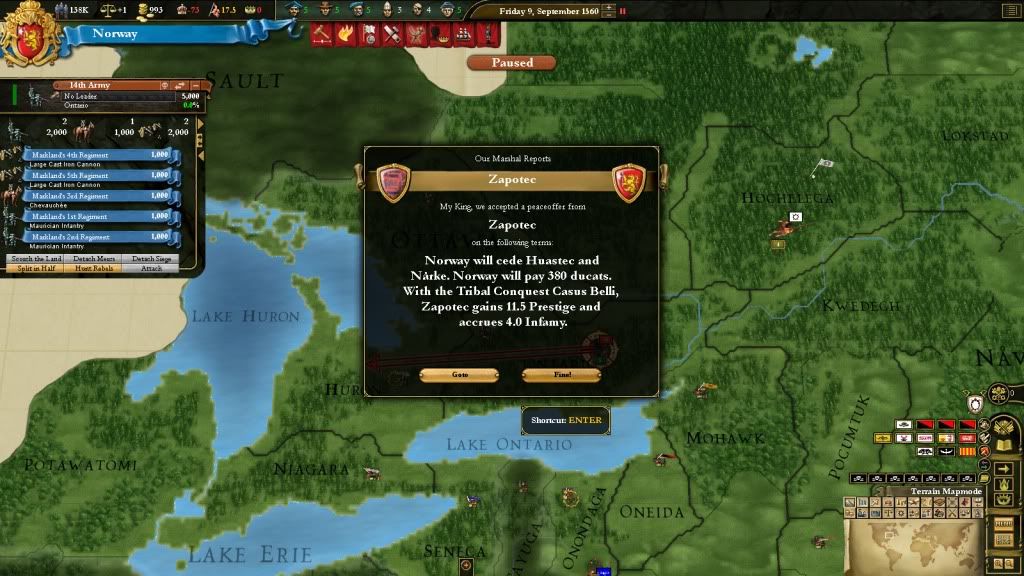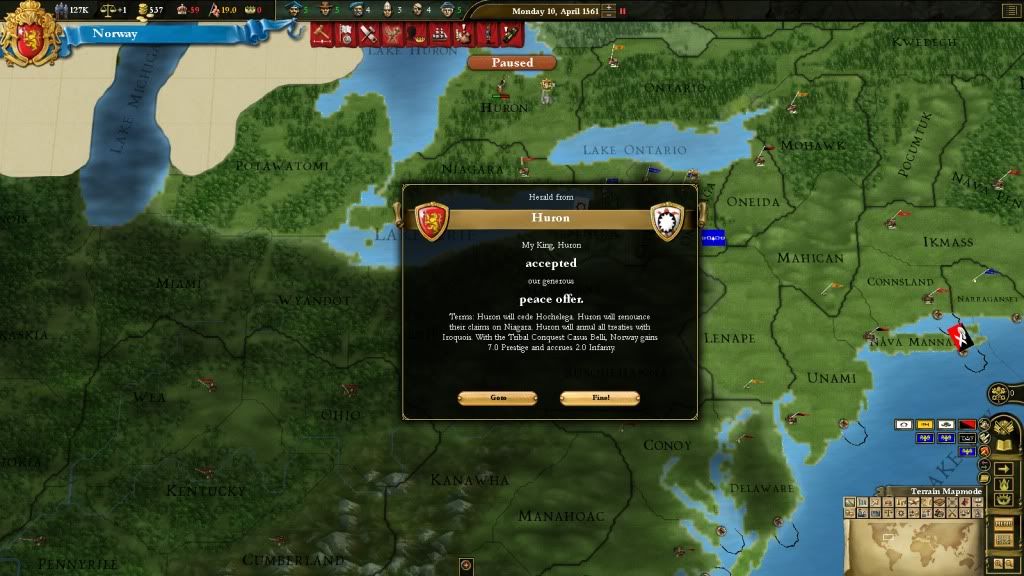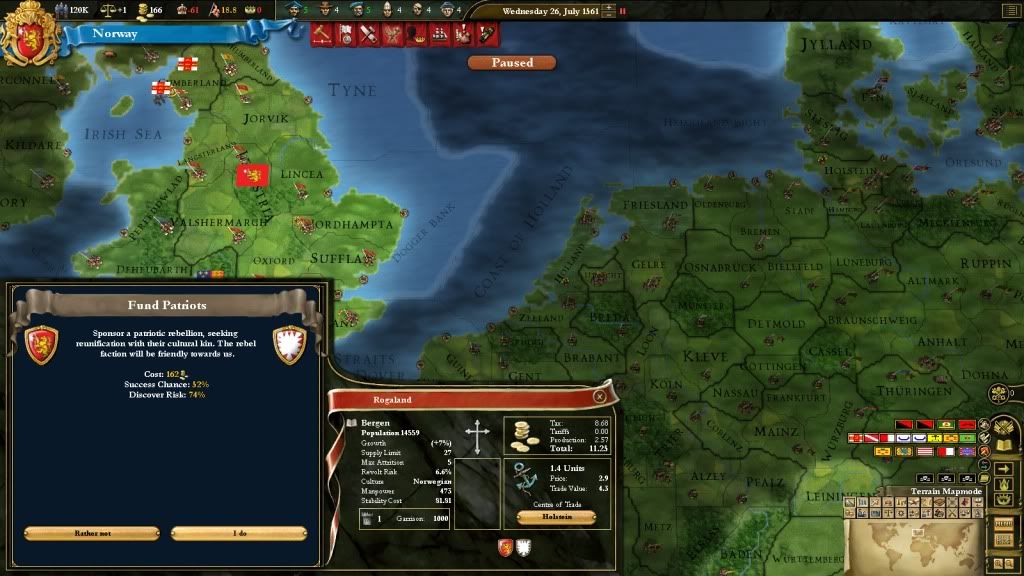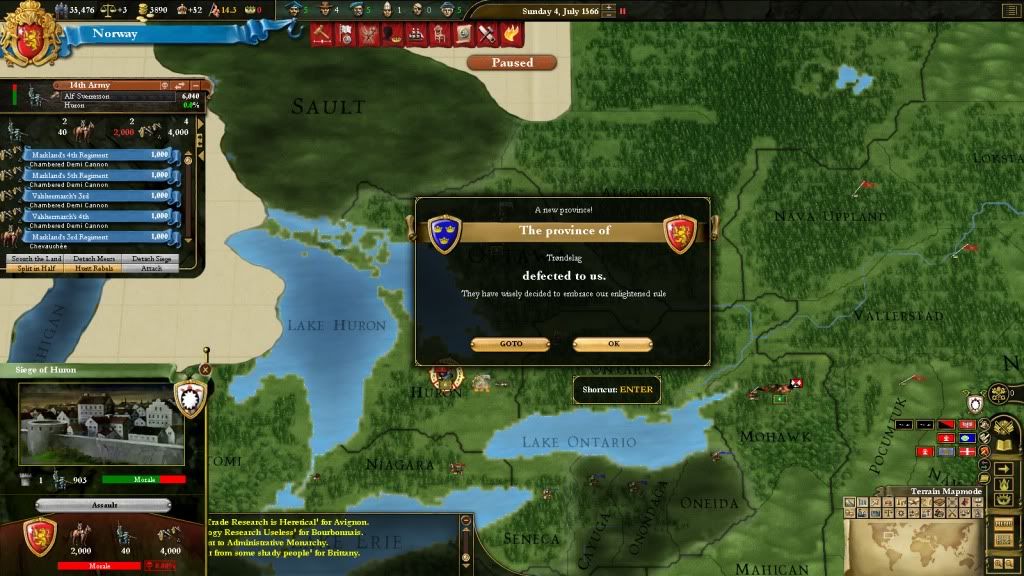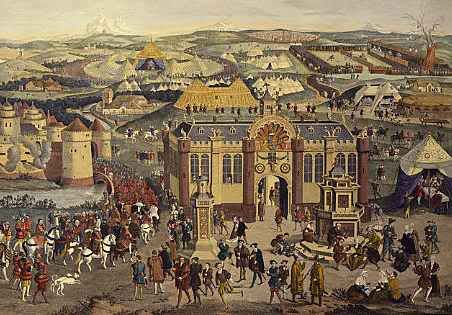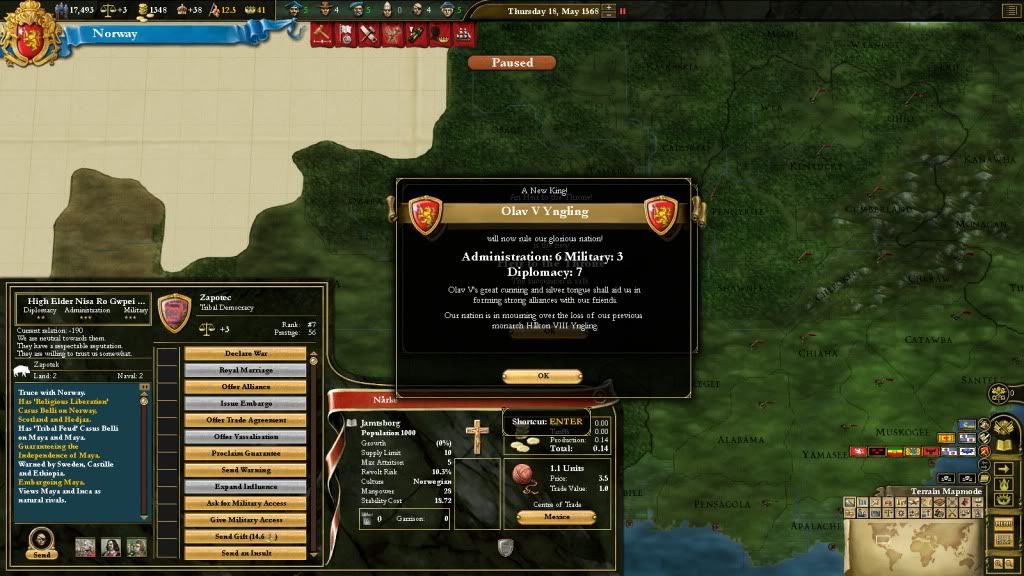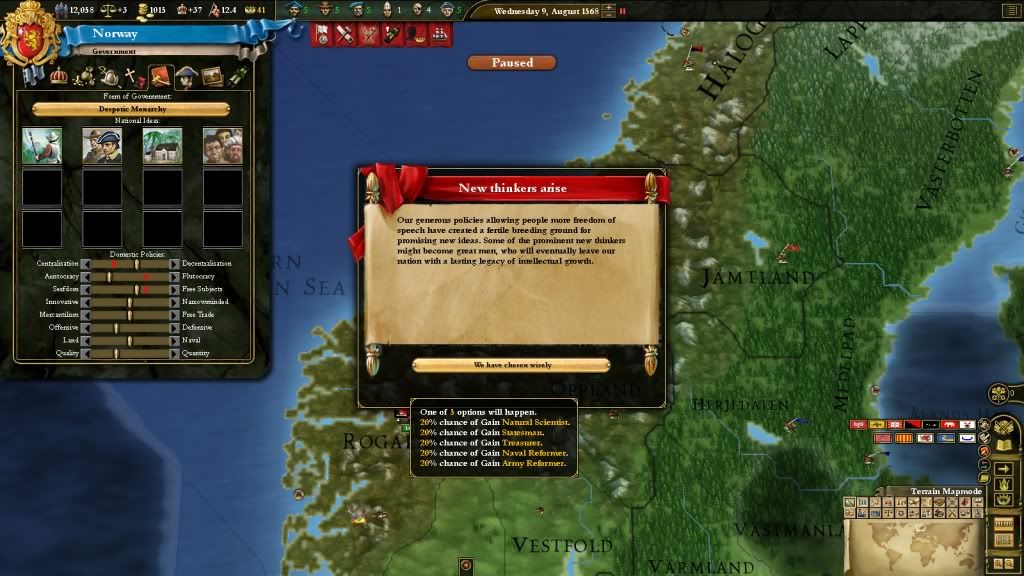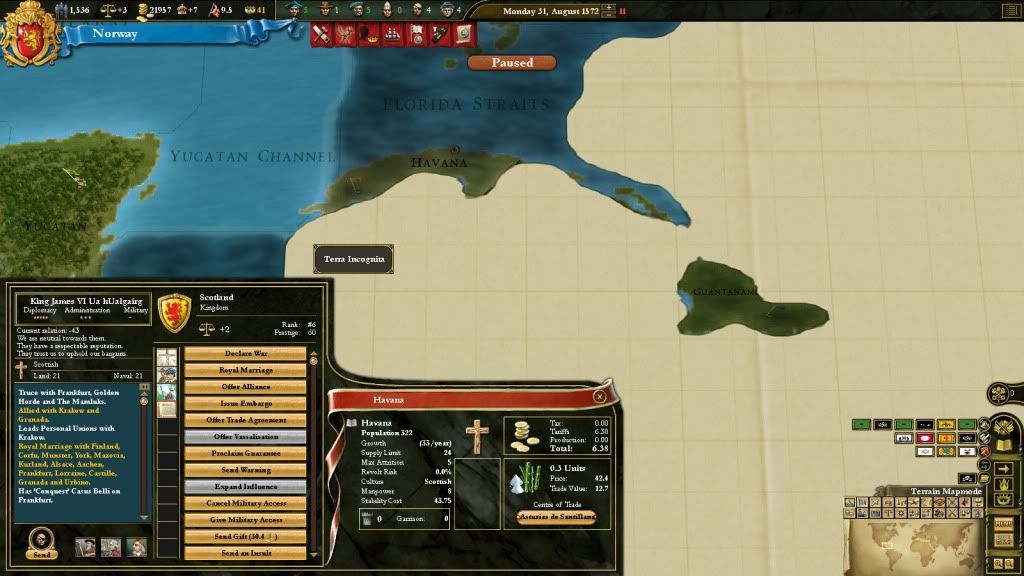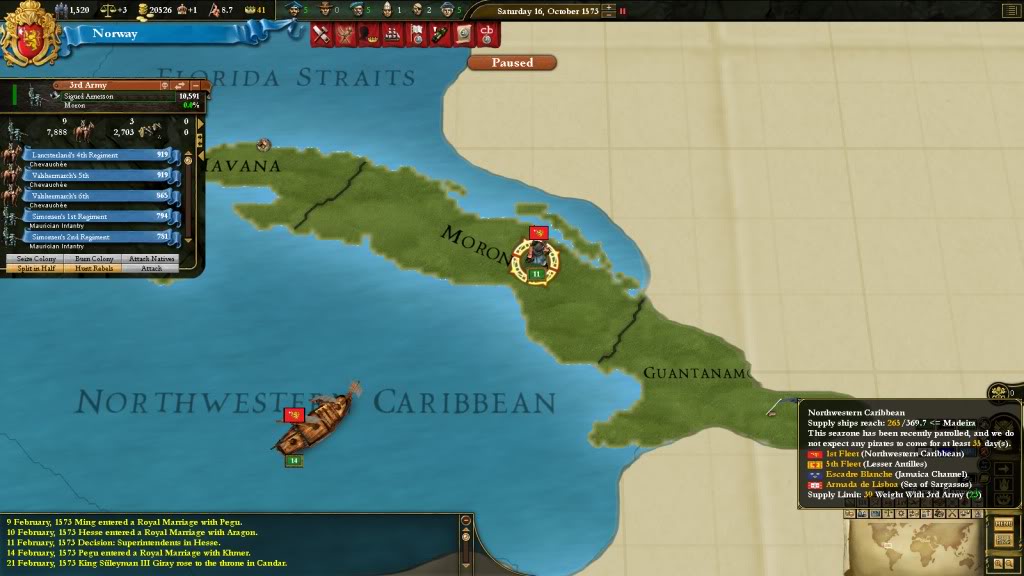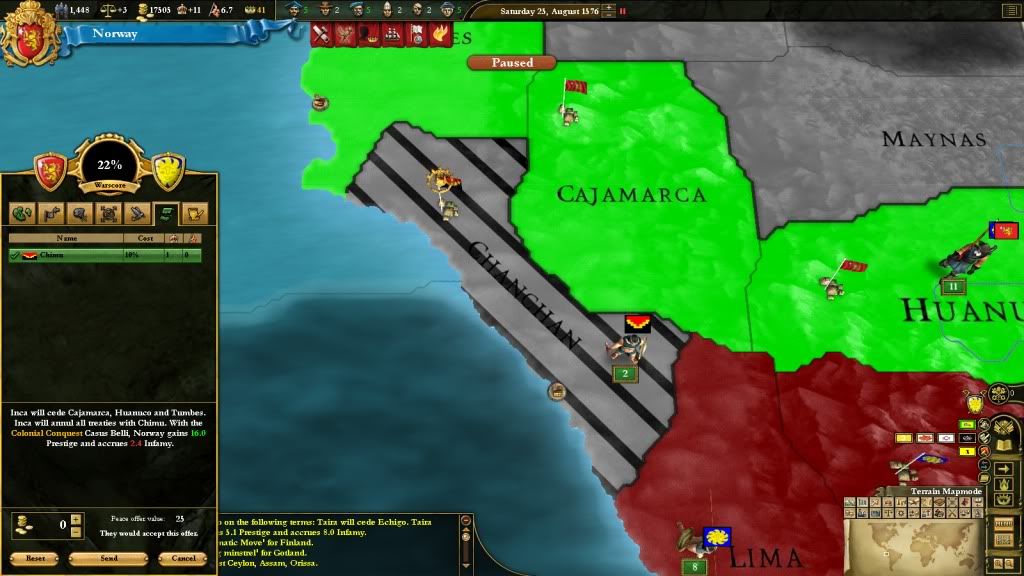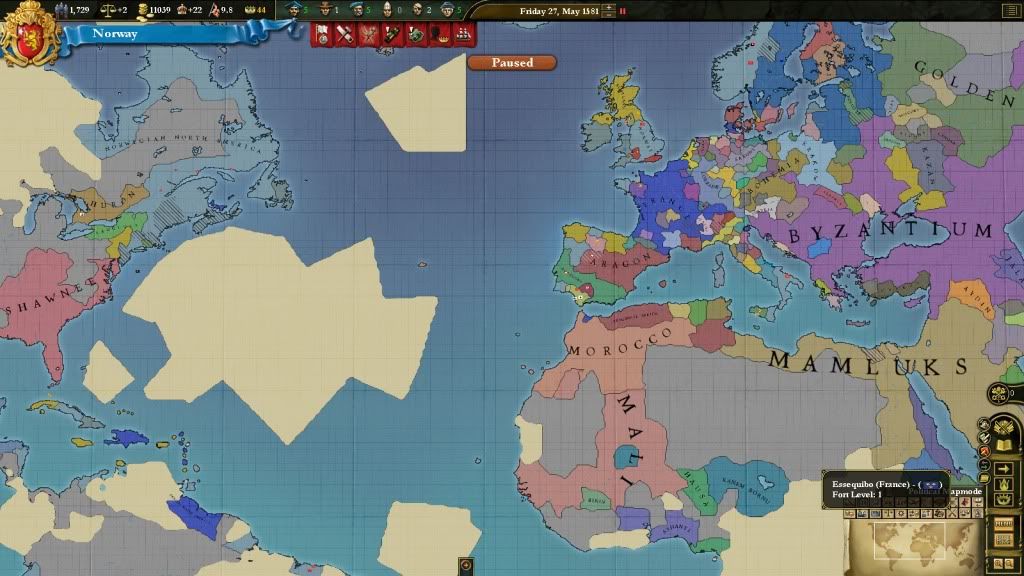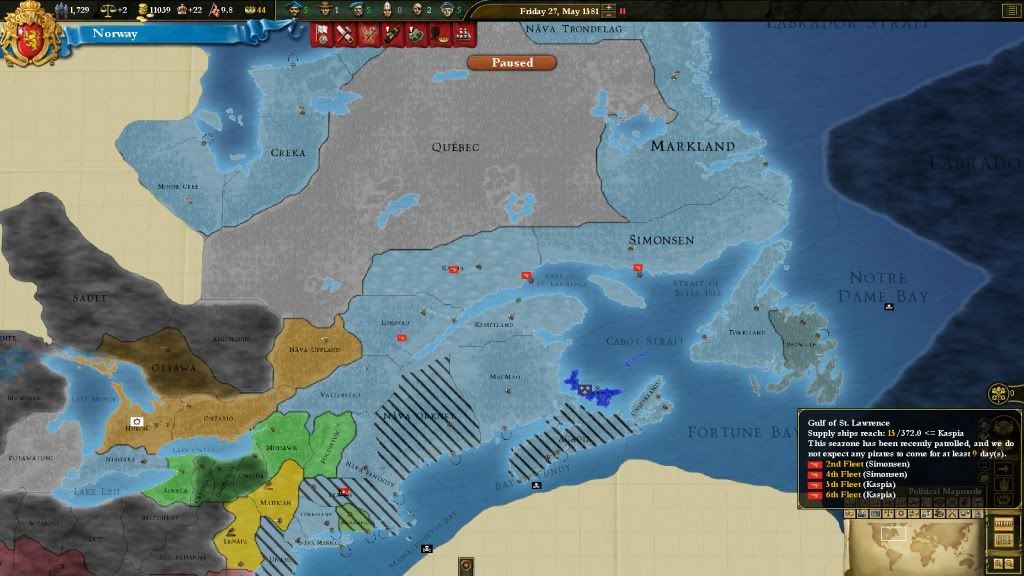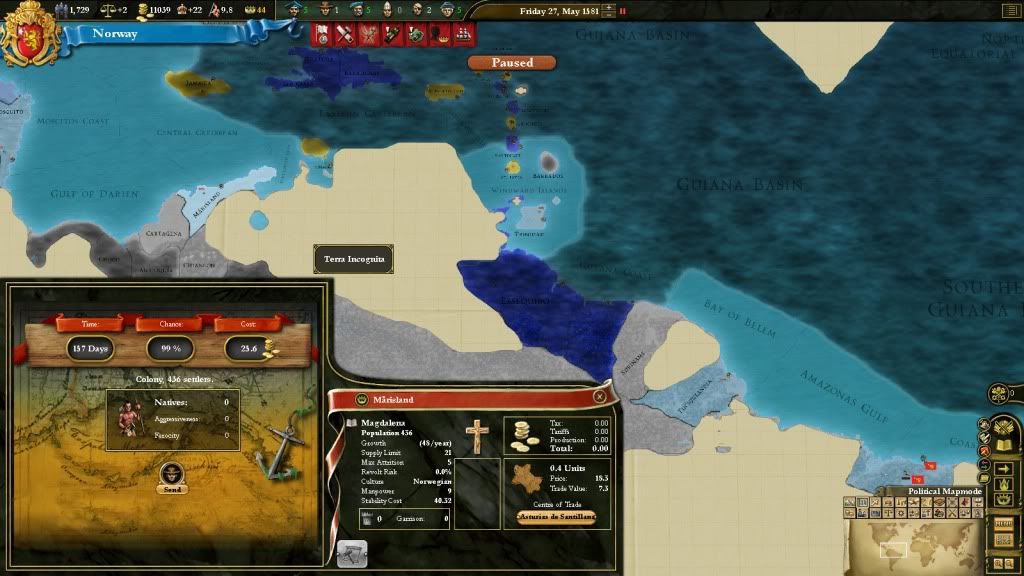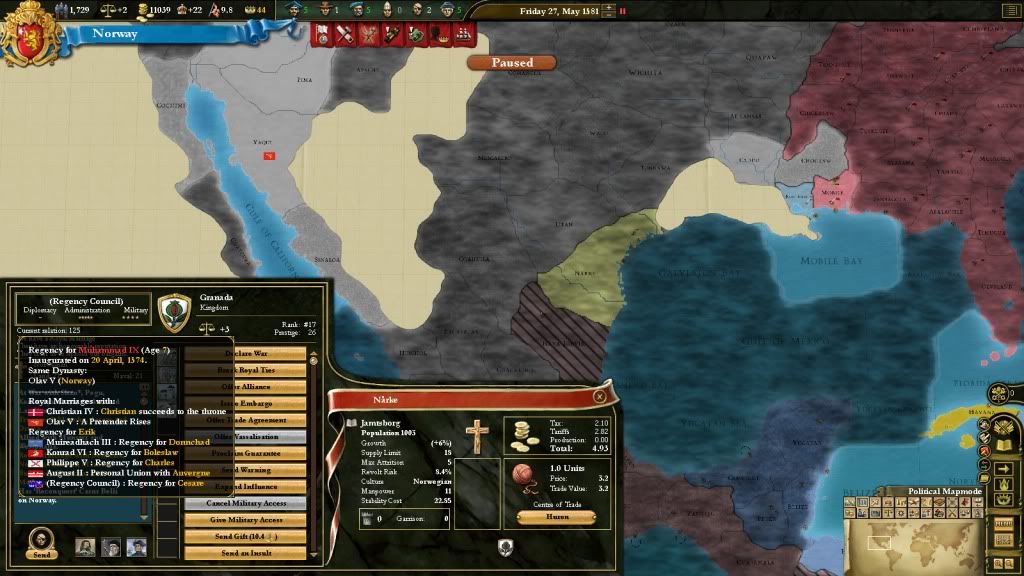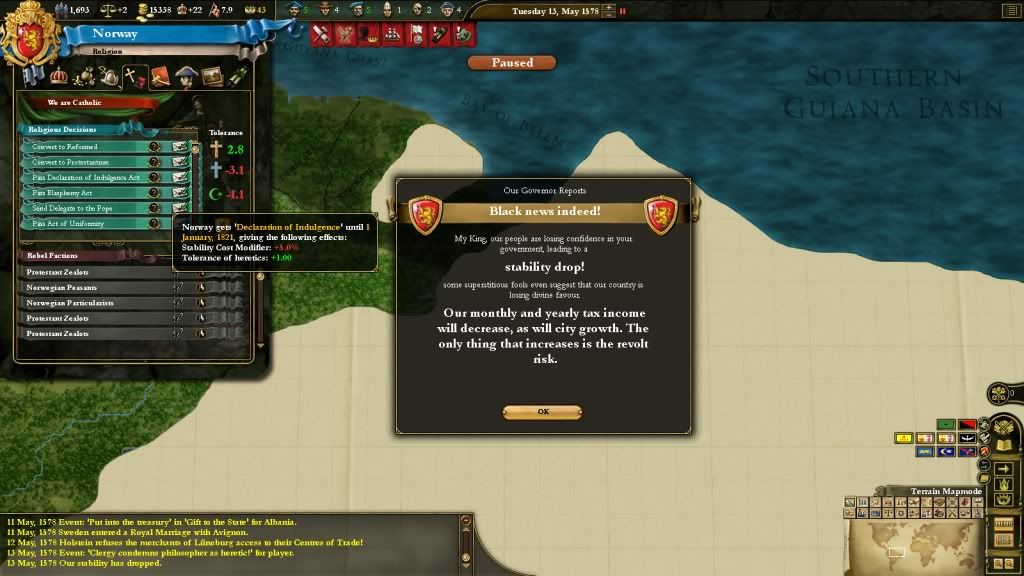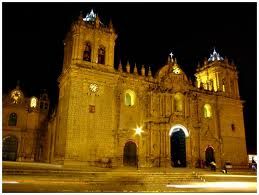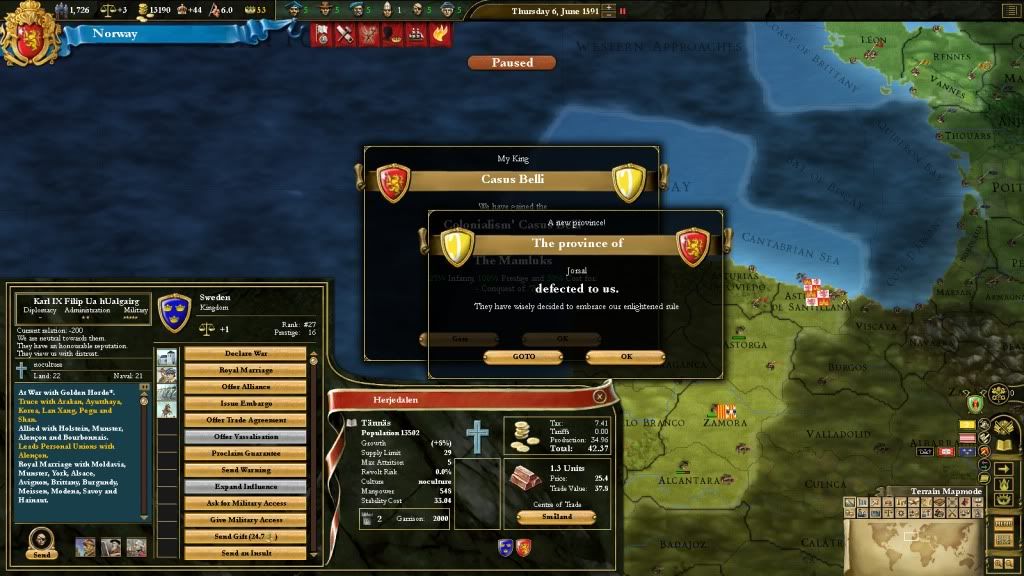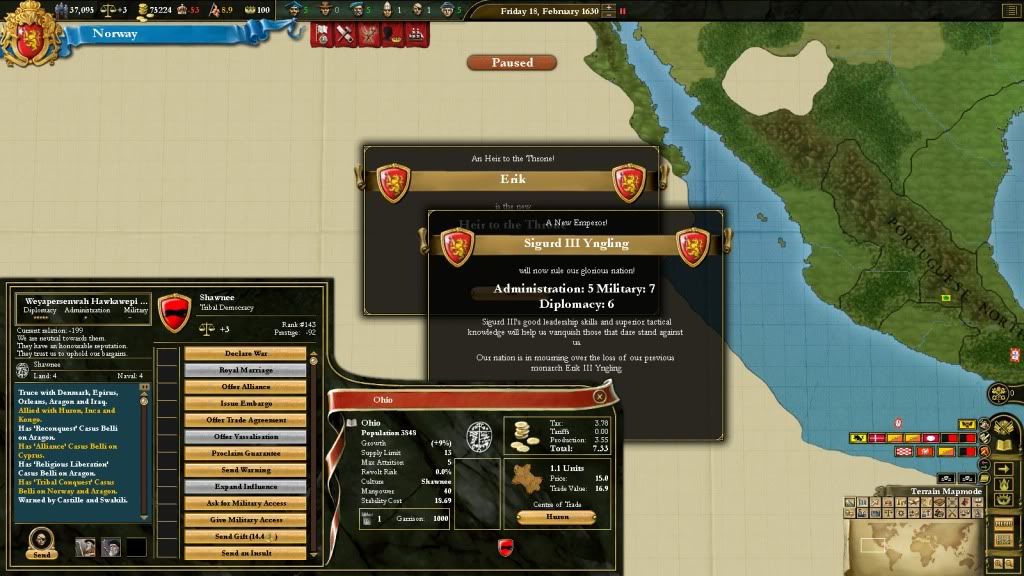So, as some of you who read the CKII portion of this mega-campaign will know, when I feel like writing but can't fit it in to the ongoing narratives I'm doing right now (since I just posted a Contevilles update and I don't feel like doing a main history-book update for this), I do what I call a tale of the 'Norseoverse', which is my term for the alternate-history universe of this AAR.
The tales 'zoom in' on the Norseoverse and illustrate, if somewhat poorly (by my own estimation) what daily life is like at the point in time and space I choose to set each tale in.
Since the last main update for this ended around 1543, this tale shall be set there in a place I imagine will be quite interesting.
Where?
You'll find out!
In His Name
A Tale of the Norseoverse
The armed caravan arrived at Thorvaldstad just as the winter rains started. Clearly the timing of their departure had been misjudged, thought Sevewulf as he got off the now-soaked wagon.
Or perhaps we should never have left Markaborg? he questioned. Nevertheless, at the entrance they met Father Peder, a priest at the Church of St. Olaf and a man with a rather rat-like face.
Father Peder said: "Welcome, welcome, to our humble little bygden. Please, make yourselves at home, don't be afraid to ask for anything, just be careful not to show your weapons in public: it scares the villagers."
Sevewulf, a middle-aged soldier, looked down at his shoulder holster containing his personal pulversky, a rather large and awkward gunpowder weapon that fired miniature Brahnjulen balls. Despite its weight and awkwardness, Sevewulf knew it would do the job he had come to Thorvaldstad for.
He walked into the town, and was not surprised with what he saw.
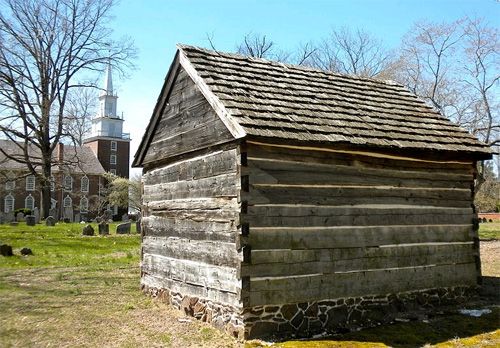
Thorvaldstad was a pathetic dump, especially to a man like Sevewulf, who had seen the great cities of Europe.
Nordhamptaborg! Uppsala! Paris! Lecce!
Even compared to Eiriksfjord or Markaborg, Thorvaldstad was pathetic: A clutch of huts and other such ramshackle dwellings and a small church whose only virtue was a view to the Gulf of St. Olaf, after which it was named.
But he was not here to gawk at the scenery. He fingered his pulver.
He was here for defense.
In the forty-two years since Folke Leifsson planted the Lion of Norway on the shores of Markland the colonists of what was already beginning to be called 'Folkesland' had learned the hard way what their heroic ancestors in the Saga of Erik the Red had known:
There is no negotiating with a Skraeling.
Oh, sure, once in a while a chief would come to Quimper in Nåva Penthiev, a colony of Catholic Bretons fleeing the Reformation, or to Eriksborg in Simonsen to make a truce or buy some ale or 'fire-water' as they termed it in their incomprehensible tongues, but mostly it was kill or be killed thousands of miles away from the organized armies and diplomacy of Europe.
Sevewulf continued on, to St. Olaf's for Mass. It was Sunday, the most torturing day in Sevewulf's week. He knew that non-Catholics had zero chance of promotion in the Norwegian military thanks to Harald V and his son Håkon VIII's Counter-Reformation which although did not wholly ban non-Catholic religions it discriminated against and persecuted them nonetheless.
I should count myself lucky, he thought as he opened the pitiful wooden door and entered the log church. I didn't have to face the Inquisition. At least, not yet.
He cracked a grim smile that only someone with a mirror could see.
Since Protestants and Reform Churchmen were still Christians despite their heretical beliefs, they could not be outright killed or their religion banned, since you could not in good conscience ban any worship that revered Jesus? Plus, there were so many followers of either breakaway church in the realm that they could not be all killed.
Instead, the Inquisition was set up by Pope Johann I to purify Catholicism from within, instead of destroying its external enemies. If you were a heretic and had never pretended to be a Catholic you simply endured the many restrictions and discrimination Protestants and Reform Churchmen were subjected to, but it was not an actual crime.
But, if (like many did) you decided to pretend to be Catholic but you were discovered to be secretly performing heretical rituals, you faced your friendly neighborhood inquisitor.
If you didn't tell him the names of other crypto-heretics, well, then, you would have to burn.
The Leifsson Clan who ran most of the Norwegian colonies in Folkesland in the name of the Crown (and indeed helped the twin western continents be named after their patriarch) jokingly called Håkon 'our dear and most beloved friend'.
In the meantime, Sevewulf walked into the church and sat down on a pew next to an acquaintance of his that had also come on the caravan, a young recruit by the name of Simon.
Father Peder followed him in, got behind the stand, and produced a Bible and set it on the stand.
"Before I perform the Mass," he said, "I would like to say a few words concerning our actions in the immediate future."
Translation of the Bible into various vernacular languages such as Norwegian or Angorse or Eirannian or Frankish had been one of the major points of the Reformation, so in the instant between the production of Peder's bible and its setting on the stand Sevewulf was able to see that the book proudly and pointedly bore the single, golden word 'VULGATA' on its cover.
Peder opened the bible a hundred and fifty or so pages in and began to read.
"The Book of Numbers, Chapter Ten" he boomed.
Sevewulf's ears pricked up. He had always preferred the earlier, Jewish Scriptures over the Christian additions.
"Verse Nine," Peder continued, and read: "When you go into battle in your own land against your enemies, sound a blast on the trumpets and you will be remembered by the Lord your God and He shall rescue you from your enemies."
Peder closed the book and looked up, directly into the gaze of the hundred or so people gathered in the small church, composed mainly of colonists and newly-arrived soldiers like Sevewulf.
Then, he said in a loud, confident voice: "Is this not our land, grant to us by Divine Providence? And are not those heathen and primitive savages we call Skraelings our enemies? And do they not seek to destroy us and overturn God's will?"
The congregation nodded as they began talking among themselves.
Peder spoke over the din, gradually overpowering it: "So if we are presented with such a threat, shall we not use the solution prescribed by God in His Scripture?"
The congregation said as one: "Of course we shall!"
So Peder continued: "Njal! Bring them out now!"
A short but muscular-seeming boy stood up from his pew and seemed to be dragging something as he made his way up to the stand, but until he reached it Sevewulf was unable to see what it was.
Peder now boomed: "These are the Trumpets of Jericho that will throw down the evil and heathen Skraelings!" as Njal held up a bunch of straight, wooden objects that took Sevewulf a few moments to realize what they were: trumpets.

Although they were recognizable trumpets, they did not look to Sevewulf like anything that had summoned him to advance or retreat in all his long years in the army.
Peder motioned to Njal, who put down all but two of the trumpets and gave one to the priest.
Then, they gave a mighty blow on the trumpets that stunned Sevewulf into almost collapsing onto the floor.
After regaining his breath, Peder cried: "Now, after the Mass, we shall march out to utterly destroy God's primitive enemies!"
**************************************************************************************
After Father Peder finished his rushed-through but yet interminable-seeming service, the entire congregation which was most of the current population of Thorvaldstad rushed out of the church of St. Olaf to their houses, except for the soldiers which had arrived with Sevewulf on the caravan.
Sevewulf drew his pulver. At crazed times like these you needed all the protection you could get.
After a few rushed minutes Sevewulf was set upon by a horde of colonists and soldiers that seemed to be led by a certain blond man who shouted: "I, Arnbjorn av Eiriksfjord, shall lead you all to destroy those Skraeling heathens! I was gathering intelligence at their camp yesterday, I know where they are! Follow me to victory!"
The undersized horde shouted various racist slurs as they rushed out of their now-deserted village with Arnbjorn at their head, and Sevewulf, caught up in the excitement followed them out.
**********************************************************************
The Skraelings were a paper threat, reflected Sevewulf after a few hours of fruitless searching.
The initial excitement from Father Peder's trumpets and Arnbjorn's demagoguery had faded after an hour or so out of Thorvaldstad with no savages in sight, dead or alive.
Now, what was once an excited mob was just a dejected collection of individuals, futilely wandering the barren landscape of the Crown Colony of Kaspia, which consisted of little other than Thorvaldstad and its mean houses and church.
Sevewulf holstered his pulver. He remembered what route they had taken despite the madness of the futile chase, and so began walking south-east, back to Thorvaldstad.
His second sight of the capital of Kaspia did surprise him.
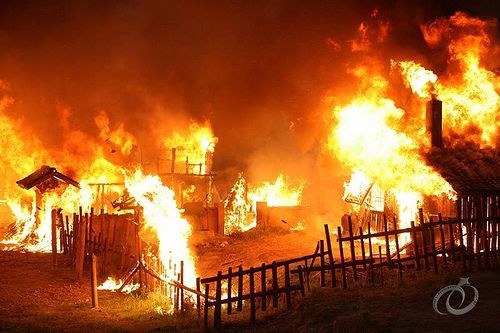
Frantic thoughts raced through the military man's mind. Who did this? How? Of course it was the Skraelings, but how did they know we weren't going to be there to stop them? They couldn't have done this if they didn't know we'd be away, they are aware of our superior weapons and that they wouldn't have a chance against us!
Against all reason, an unknown gravity pulled him towards the burning village.
**********************************************************************************
The flames had mostly died down when Sevewulf arrived back at Thorvaldstad.
The church of St. Olaf seemed to be the only building still standing, so he headed there for some clues.
He was not prepared for the second surprise of the day that struck him as he entered Peder's pathetic little chapel.
He saw the ratty-faced priest, with short Njal, talking animatedly in a strange language with a feather-wearing person whom Sevewulf assumed to be a Skraeling chief like the one he had seen a prisoner back in Markaborg.
He drew the pulversky once more, then approached the conversants in slow, measured steps weighed down by disbelief.
It didn't take long for the Skraeling to spot him, but the native hadn't considered something:
Gunpowder weapons. Before the chief could do anything of importance Sevewulf had cocked his weapons and squeezed the trigger hard. In a flash of lightening and deafening noise the Skraeling's head exploded in a fireball of blood.
Shocked, both the priest and the boy went on their knees next to the downed native, as Sevewulf approached them.
It took only a moment for Sevewulf's brain to work out just what Peder had done.
He whispered a word: "Why?"
Peder, too terrified to stand up replied in a quivering tone: "It was for him."
He indicated Njal.
Somehow, he found the courage to continue and said: "They threatened to take him as a slave. He.. he was mine."
Sevewulf understood. Nevertheless, the image of burning Thorvaldstad along with all the other burned innocents flashed into his head, replacing the live one of the kneeling priest and boy, and he squeezed the trigger once, downing Peder, then aimed his weapon to the right and fired again, obliterating any living remain of Njal's stomach.
But then he realized the true cause of his killings, and knelt away from the cross at the altar and whispered:" Lord God, what have I done in Your name and the name of Your slain servants?"
Just as blond Arnbjorn rushed into the church and ran towards him, he raised the pulversky to his head, and muttered six words in an ancient tongue alien to all in the area, Skraeling and Norwegian alike except for him, then pulled the trigger, emptying the stock and his body of life.
But, fortunately, Arnbjorn survived the burning of Thorvaldstad and, after it was rebuilt ten years later, wrote an anti-Skraeling pamphlet entitled: The Martyr of Thorvaldstad in whose second-to-last paragraph he recorded Sevewulf's last words: "Shema Yisrael, Adonai Eloheinu, Adonai Echad."
It was the eternal cry of a tortured people, the people that would, as Arnbjorn prophetically wrote: "Return to their rightful land, the Holy Land that God Himself promised to them unto eternity."
The tales 'zoom in' on the Norseoverse and illustrate, if somewhat poorly (by my own estimation) what daily life is like at the point in time and space I choose to set each tale in.
Since the last main update for this ended around 1543, this tale shall be set there in a place I imagine will be quite interesting.
Where?
You'll find out!
In His Name
A Tale of the Norseoverse
The armed caravan arrived at Thorvaldstad just as the winter rains started. Clearly the timing of their departure had been misjudged, thought Sevewulf as he got off the now-soaked wagon.
Or perhaps we should never have left Markaborg? he questioned. Nevertheless, at the entrance they met Father Peder, a priest at the Church of St. Olaf and a man with a rather rat-like face.
Father Peder said: "Welcome, welcome, to our humble little bygden. Please, make yourselves at home, don't be afraid to ask for anything, just be careful not to show your weapons in public: it scares the villagers."
Sevewulf, a middle-aged soldier, looked down at his shoulder holster containing his personal pulversky, a rather large and awkward gunpowder weapon that fired miniature Brahnjulen balls. Despite its weight and awkwardness, Sevewulf knew it would do the job he had come to Thorvaldstad for.
He walked into the town, and was not surprised with what he saw.

Thorvaldstad was a pathetic dump, especially to a man like Sevewulf, who had seen the great cities of Europe.
Nordhamptaborg! Uppsala! Paris! Lecce!
Even compared to Eiriksfjord or Markaborg, Thorvaldstad was pathetic: A clutch of huts and other such ramshackle dwellings and a small church whose only virtue was a view to the Gulf of St. Olaf, after which it was named.
But he was not here to gawk at the scenery. He fingered his pulver.
He was here for defense.
In the forty-two years since Folke Leifsson planted the Lion of Norway on the shores of Markland the colonists of what was already beginning to be called 'Folkesland' had learned the hard way what their heroic ancestors in the Saga of Erik the Red had known:
There is no negotiating with a Skraeling.
Oh, sure, once in a while a chief would come to Quimper in Nåva Penthiev, a colony of Catholic Bretons fleeing the Reformation, or to Eriksborg in Simonsen to make a truce or buy some ale or 'fire-water' as they termed it in their incomprehensible tongues, but mostly it was kill or be killed thousands of miles away from the organized armies and diplomacy of Europe.
Sevewulf continued on, to St. Olaf's for Mass. It was Sunday, the most torturing day in Sevewulf's week. He knew that non-Catholics had zero chance of promotion in the Norwegian military thanks to Harald V and his son Håkon VIII's Counter-Reformation which although did not wholly ban non-Catholic religions it discriminated against and persecuted them nonetheless.
I should count myself lucky, he thought as he opened the pitiful wooden door and entered the log church. I didn't have to face the Inquisition. At least, not yet.
He cracked a grim smile that only someone with a mirror could see.
Since Protestants and Reform Churchmen were still Christians despite their heretical beliefs, they could not be outright killed or their religion banned, since you could not in good conscience ban any worship that revered Jesus? Plus, there were so many followers of either breakaway church in the realm that they could not be all killed.
Instead, the Inquisition was set up by Pope Johann I to purify Catholicism from within, instead of destroying its external enemies. If you were a heretic and had never pretended to be a Catholic you simply endured the many restrictions and discrimination Protestants and Reform Churchmen were subjected to, but it was not an actual crime.
But, if (like many did) you decided to pretend to be Catholic but you were discovered to be secretly performing heretical rituals, you faced your friendly neighborhood inquisitor.
If you didn't tell him the names of other crypto-heretics, well, then, you would have to burn.
The Leifsson Clan who ran most of the Norwegian colonies in Folkesland in the name of the Crown (and indeed helped the twin western continents be named after their patriarch) jokingly called Håkon 'our dear and most beloved friend'.
In the meantime, Sevewulf walked into the church and sat down on a pew next to an acquaintance of his that had also come on the caravan, a young recruit by the name of Simon.
Father Peder followed him in, got behind the stand, and produced a Bible and set it on the stand.
"Before I perform the Mass," he said, "I would like to say a few words concerning our actions in the immediate future."
Translation of the Bible into various vernacular languages such as Norwegian or Angorse or Eirannian or Frankish had been one of the major points of the Reformation, so in the instant between the production of Peder's bible and its setting on the stand Sevewulf was able to see that the book proudly and pointedly bore the single, golden word 'VULGATA' on its cover.
Peder opened the bible a hundred and fifty or so pages in and began to read.
"The Book of Numbers, Chapter Ten" he boomed.
Sevewulf's ears pricked up. He had always preferred the earlier, Jewish Scriptures over the Christian additions.
"Verse Nine," Peder continued, and read: "When you go into battle in your own land against your enemies, sound a blast on the trumpets and you will be remembered by the Lord your God and He shall rescue you from your enemies."
Peder closed the book and looked up, directly into the gaze of the hundred or so people gathered in the small church, composed mainly of colonists and newly-arrived soldiers like Sevewulf.
Then, he said in a loud, confident voice: "Is this not our land, grant to us by Divine Providence? And are not those heathen and primitive savages we call Skraelings our enemies? And do they not seek to destroy us and overturn God's will?"
The congregation nodded as they began talking among themselves.
Peder spoke over the din, gradually overpowering it: "So if we are presented with such a threat, shall we not use the solution prescribed by God in His Scripture?"
The congregation said as one: "Of course we shall!"
So Peder continued: "Njal! Bring them out now!"
A short but muscular-seeming boy stood up from his pew and seemed to be dragging something as he made his way up to the stand, but until he reached it Sevewulf was unable to see what it was.
Peder now boomed: "These are the Trumpets of Jericho that will throw down the evil and heathen Skraelings!" as Njal held up a bunch of straight, wooden objects that took Sevewulf a few moments to realize what they were: trumpets.

Although they were recognizable trumpets, they did not look to Sevewulf like anything that had summoned him to advance or retreat in all his long years in the army.
Peder motioned to Njal, who put down all but two of the trumpets and gave one to the priest.
Then, they gave a mighty blow on the trumpets that stunned Sevewulf into almost collapsing onto the floor.
After regaining his breath, Peder cried: "Now, after the Mass, we shall march out to utterly destroy God's primitive enemies!"
**************************************************************************************
After Father Peder finished his rushed-through but yet interminable-seeming service, the entire congregation which was most of the current population of Thorvaldstad rushed out of the church of St. Olaf to their houses, except for the soldiers which had arrived with Sevewulf on the caravan.
Sevewulf drew his pulver. At crazed times like these you needed all the protection you could get.
After a few rushed minutes Sevewulf was set upon by a horde of colonists and soldiers that seemed to be led by a certain blond man who shouted: "I, Arnbjorn av Eiriksfjord, shall lead you all to destroy those Skraeling heathens! I was gathering intelligence at their camp yesterday, I know where they are! Follow me to victory!"
The undersized horde shouted various racist slurs as they rushed out of their now-deserted village with Arnbjorn at their head, and Sevewulf, caught up in the excitement followed them out.
**********************************************************************
The Skraelings were a paper threat, reflected Sevewulf after a few hours of fruitless searching.
The initial excitement from Father Peder's trumpets and Arnbjorn's demagoguery had faded after an hour or so out of Thorvaldstad with no savages in sight, dead or alive.
Now, what was once an excited mob was just a dejected collection of individuals, futilely wandering the barren landscape of the Crown Colony of Kaspia, which consisted of little other than Thorvaldstad and its mean houses and church.
Sevewulf holstered his pulver. He remembered what route they had taken despite the madness of the futile chase, and so began walking south-east, back to Thorvaldstad.
His second sight of the capital of Kaspia did surprise him.

Frantic thoughts raced through the military man's mind. Who did this? How? Of course it was the Skraelings, but how did they know we weren't going to be there to stop them? They couldn't have done this if they didn't know we'd be away, they are aware of our superior weapons and that they wouldn't have a chance against us!
Against all reason, an unknown gravity pulled him towards the burning village.
**********************************************************************************
The flames had mostly died down when Sevewulf arrived back at Thorvaldstad.
The church of St. Olaf seemed to be the only building still standing, so he headed there for some clues.
He was not prepared for the second surprise of the day that struck him as he entered Peder's pathetic little chapel.
He saw the ratty-faced priest, with short Njal, talking animatedly in a strange language with a feather-wearing person whom Sevewulf assumed to be a Skraeling chief like the one he had seen a prisoner back in Markaborg.
He drew the pulversky once more, then approached the conversants in slow, measured steps weighed down by disbelief.
It didn't take long for the Skraeling to spot him, but the native hadn't considered something:
Gunpowder weapons. Before the chief could do anything of importance Sevewulf had cocked his weapons and squeezed the trigger hard. In a flash of lightening and deafening noise the Skraeling's head exploded in a fireball of blood.
Shocked, both the priest and the boy went on their knees next to the downed native, as Sevewulf approached them.
It took only a moment for Sevewulf's brain to work out just what Peder had done.
He whispered a word: "Why?"
Peder, too terrified to stand up replied in a quivering tone: "It was for him."
He indicated Njal.
Somehow, he found the courage to continue and said: "They threatened to take him as a slave. He.. he was mine."
Sevewulf understood. Nevertheless, the image of burning Thorvaldstad along with all the other burned innocents flashed into his head, replacing the live one of the kneeling priest and boy, and he squeezed the trigger once, downing Peder, then aimed his weapon to the right and fired again, obliterating any living remain of Njal's stomach.
But then he realized the true cause of his killings, and knelt away from the cross at the altar and whispered:" Lord God, what have I done in Your name and the name of Your slain servants?"
Just as blond Arnbjorn rushed into the church and ran towards him, he raised the pulversky to his head, and muttered six words in an ancient tongue alien to all in the area, Skraeling and Norwegian alike except for him, then pulled the trigger, emptying the stock and his body of life.
But, fortunately, Arnbjorn survived the burning of Thorvaldstad and, after it was rebuilt ten years later, wrote an anti-Skraeling pamphlet entitled: The Martyr of Thorvaldstad in whose second-to-last paragraph he recorded Sevewulf's last words: "Shema Yisrael, Adonai Eloheinu, Adonai Echad."
It was the eternal cry of a tortured people, the people that would, as Arnbjorn prophetically wrote: "Return to their rightful land, the Holy Land that God Himself promised to them unto eternity."


